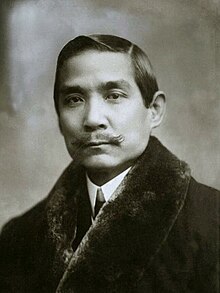Sun Yat-sen
Appearance
(Redirected from Sun Yat Sen)

Sun Yat-sen (孫逸仙, November 12, 1866 – March 12, 1925) was a Chinese revolutionary leader and statesman who is considered by many to be the "Father of Modern China". He was known as several names including 孫中山 and 孫文. He had a significant influence in the overthrow of the Qing Dynasty and establishment of the original Republic of China.
Quotes
[edit]- It is only after mature deliberation and thorough preparation that I have decided upon the Program of Revolution and defined the procedure of the revolution in three stages. The first is the period of military government; the second, the period of political tutelage; and the third, the period of constitutional government.
- The Three Phases of National Reconstruction (1918)
- The Chinese people have only family and clan solidarity; they do not have national spirit...they are just a heap of loose sand...Other men are the carving knife and serving dish; we are the fish and the meat.
- China as a Heap of Loose Sand (1924)
- China is now suffering from poverty, not from unequal distribution of wealth. Where there are inequalities of wealth, the methods of Marx can, of course, be used; a class war can be advocated to destroy the inequalities. But in China, where industry is not yet developed, Marx's class war and dictatorship of the proletariat are impracticable.
- Capital and the State (1924)
- In the construction of a country, it is not the practical workers but the idealists and planners that are difficult to find.
- Chung-shan Ch'üan-shu (Zhongshan Quanshu), vol. II (1936)
- To understand is difficult; to act is easy.
- Only powerful people have liberty.
- As quoted in "The Economist" (8 October 2011), p. 67
- I am the one who will crush the Qing utterly. With the power of sun and moon I will smash through the boundaries of Helanshan pass. With fire and fury I shall come to the city of the Nanluo kings, and the might of the Yanhuang will rise again.
- Legacy of the Hegemon (1902)
See also
[edit]
External links
[edit]- ROC Government Biography
- Sun Yat-sen in Hong Kong - University of Hong Kong Libraries, Digital Initiatives
- Contemporary views of Sun among overseas Chinese
- Yokohama Overseas Chinese School established by Dr. Sun Yat-sen
- National Dr. Sun Yat-sen Memorial Hall Official Website
- Dr. Sun Yat-Sen Foundation of Hawaii
- Works by Sun Yat-sen at Project Gutenberg



